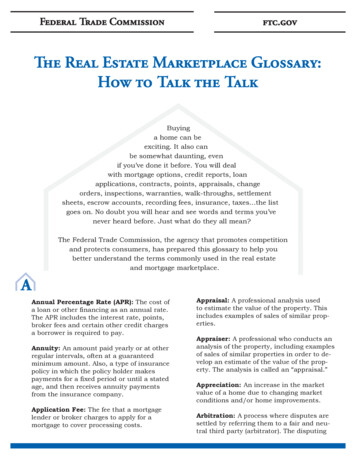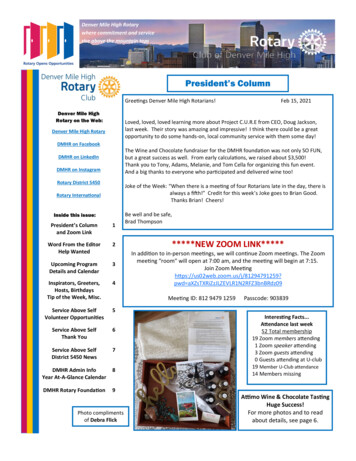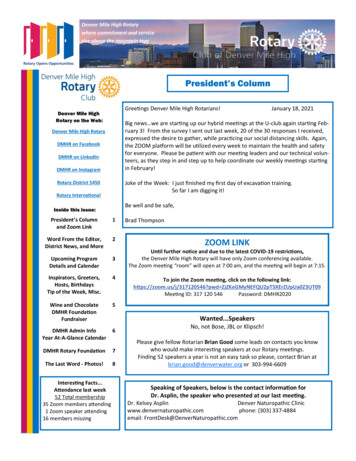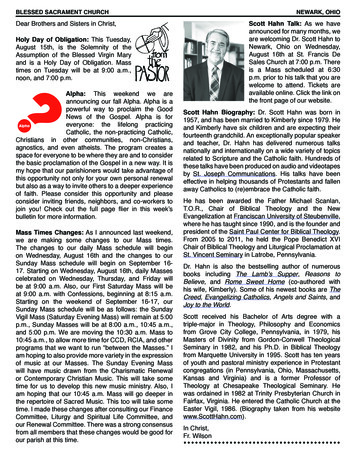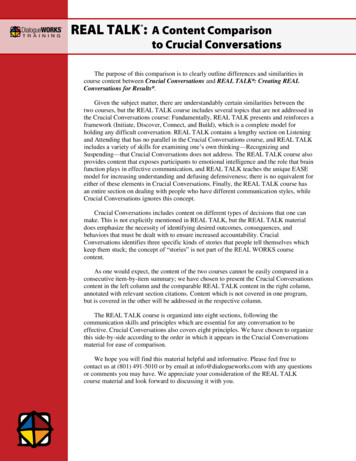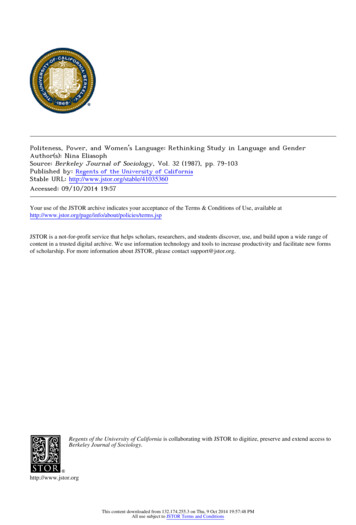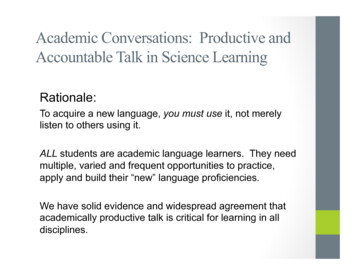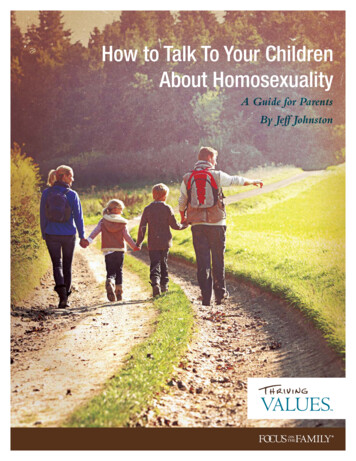
Transcription
How to Talk To Your ChildrenAbout HomosexualityA Guide for ParentsBy Jeff Johnston1
ContentsPRESCHOOL AGES 0-6Framing the IssueReal-Life ScenarioPossible ResponsesReliable Resources3455ELEMENTARY AGES 6-12Framing the IssueReal-Life ScenariosPossible ResponsesReliable Resources6799JUNIOR HIGH & BEYOND AGES 12 AND UPFraming the IssueReal-Life ScenariosPossible ResponsesReliable Resources10111214PLEASE NOTE:This resource does not provide information or advice about helping children or teens who have “come out” andidentify as gay or bisexual, assisting those who are struggling with gender confusion, or counseling those whowere sexually abused and may be questioning their sexual identity. Instead, this guide is for parents addressingtheir children about homosexuality when it is encountered in the culture.For assistance and resources for serious concerns such as those listed above, please call Focus on the Family’scounseling service at 1-800-A-FAMILY (232-6459) weekdays 6:00 a.m. to 8:00 p.m. (Mountain Time). Pleasebe prepared to leave your contact information for a counselor or chaplain who will return your call as soonas possible. The consultation is available at no cost to you. You may also reach our counselors online andarrange for a callback by filling out our Counseling Request Form here: In addition, we have online resources for help in these and other areas. Go to focusonthefamily.com and click onthe “Get Help” button at the top of the page.2
AGES AND STAGESPRESCHOOL AGES 0-6FRAMING THE ISSUE: A FOUR-PART STORYTeach your children a simple, four-part story of our world: God made agood world; people did not obey God and sinned; God forgives, saves andtransforms those who follow Jesus Christ; and He will gloriously remakeus and this world.When children take in and process new information, they startfrom what they already know, connecting new information totheir previous knowledge. Before your children are evenaware of homosexuality, begin by giving them abiblical view of the world.In other words, you are framing the issue for them by teachingthem about God and His redemptive plan humankind. You areproviding your children with a basic understanding of the worldin which we live. We always want to start with what’s good whentalking about difficult subjects, so we begin by teaching aboutGod’s plan for us and our sexuality. That gives us a foundation forthen discussing any problem issues.Find a good children’s Bible or Bible storybookand read it with your child. As they grow and learn, thisframework provides the starting place for discussing issues such ashomosexuality.You are framingthe issue for themby teaching themabout God and Hisredemptive planfor humankind.Creation God made the earth and all that’s in it; He is the sourceof all life. God made people in His image and loves us very much.You are deeplyloved by God. God separated humanity into male and female. Both boys and girls (andmen and women) are good, but different. Children come from a mother and father; God intended parents to love,care for, protect, teach and guide children as they grow. God gives us good gifts, like friendship, marriage and family.The Fall Adam and Eve disobeyed God and sinned. They did not trust God and didwhat God told them not to do. They ate from the tree of the knowledgeof good and evil. This had bad consequences, as sin and death entered the world. People do wrong things, even moms and dads, and we all need God toforgive us and help us do what’s right. When we do something wrong, we admit it and ask other people toforgive us, too.3
RedemptionPRESCHOOL AGES 0-6 Thankfully, God set about bringing redemption to the earth from the verybeginning, promising to Eve that a Savior would come. This thread of salvation and redemption is woven throughout the OldTestament, growing and expanding, as God makes promises to Noah,Abraham, Isaac, Jacob, Moses and all Israel. All those promises are fulfilled in Jesus Christ, whose message is that allmay come into the life and redemption God has promised and becomeHis followers. The good news is that Jesus’ life, death, burial and resurrection bringssalvation and freedom from sin! When we choose to put our confidence in Jesus and follow Him, we areborn into God’s family. God gives His children the Holy Spirit to help,guide and transform us in the middle of a fallen world. God helps us to treat all people with kindness, even those who sin againstus, who are different from us or with whom we disagree.Glorification Our future union with Christ is portrayed in Scripture as a wedding feast,where we are united with Christ like a bride and her husband. Those who follow Jesus will be with Him forever in a new heaven andearth. The Bible tells us that this will be a world with no pain, sin or sadness. We have a future and a sure hope, because God has made these promisesto those who follow Him.Use simple Bible stories, such as the Creation story, to show howGod made Adam and Eve for each other and created the firstmarriage. Use the story of Noah to show the animals, two-by-two, male andfemale, going into the ark. A mommy animal and a daddy animal together have ababy animal.Also use examples from life to teach these truths, explaining, for example, thatMom and Dad were married—marriage is a good gift from God. When a child seessomething bad, you might explain how sin brought pain into the world. When yourchildren start noticing that boys and girls are different, use that to talk about Godseparating humanity into male and female. Life is full of such teachable moments!REAL-LIFE SCENARIOYour family is traveling and visits a new city. It’s June, right when school lets outfor summer vacation. As you enjoy the sights, you begin to notice rainbow flags,t-shirts and displays, and your family starts to see same-sex couples holding hands.You’ve stumbled into a gay pride celebration, complete with parade and festivities.Your young son or daughter asks: “Why are those two men holding hands? Why arethose two women kissing? What do all those rainbow flags mean?”4
PRESCHOOL AGES 0-6Possible ResponsesThese depend on the age of the child, his or her level of concernabout this scenario and his or her verbal and abstract ability: “Because of God’s word, the Bible, we believe God made men andwomen, and He planned marriage to be between a husband and wife. Butsin came into the world and causes all of us to do wrong things. Onewrong thing some grownups do is try to change God’s plan for marriageso that two men or two women can marry.” “Not everyone believes and follows God’s plan formarriage, so sometimes two women will act like theyare married. But they can’t really be a husband and wife,because they are both women. Sin has confused them,and they need God’s help to follow Him.” “God made marriage to be between a man and a woman.But not everyone obeys God and follows His plan. Sosometimes two men will decide to marry. But we believethat marriage really is between a husband and wife.” “When men and women grow up, most of them getmarried. God made marriage to be between one manand one woman. But because we live in a world wherepeople do wrong things, sometimes two men will getmarried. Jesus can help them.”Word of CautionAt this age, you aren’t talking to your childrenabout specific sexual activity; they’re not equipped tohandle adult sexuality. Furthermore, we suggest waiting untilkids are older before introducing terms such as “homosexuality,”“heterosexuality,” “gay,” “straight,” “LGBT” or any of its variants.Use simple Biblestories, such asthe Creation story,to show how Godmade Adam andEve for each otherand created thefirst marriage.In addition, we also suggest not saying somethinglike, “Those men are gay. Gay is when two guys like each other.”That’s confusing to boys, who at this age are developing a stronger internal senseof masculinity—primarily through distancing themselves from girls and identifyingwith and relating to other boys and men.It’s very healthy and normal for a boy to have older boys and men who function asheroes or role models. Explaining homosexuality as “two guys who like each other”could prompt a young boy to doubt himself or his own feelings. He might think tohimself, “I’m a boy and I like boys. Does that mean I’m gay?” Some children havecome home from school lessons on homosexuality and asked this very question.The same would absolutely apply to girls. We suggest you avoid such statements as,“Being homosexual or lesbian is when two girls like each other.” This takes what is anormal, healthy developmental stage—girls liking and connecting with each otheror following older girls as role models—and equates it with homosexuality.Reliable ResourcesClick here for helpful, reliable resources for help understanding and teaching yourchildren about marriage, relationships and sexuality.5
AGES AND STAGESELEMENTARY AGES 6-12FRAMING THE ISSUE: THERE ARE DIFFERENT TYPES OF LOVE.Setting the big picture about love, relationships and marriage will give yourchildren a framework for thinking about these important issues. God hasgiven humanity a number of good gifts, including marriage, love, friendshipand family. As in the previous section, we want to start with God’s goodintentions before discussing problems and sin.Borrowing on C.S. Lewis’ ideas from The Four Loves, this would be a goodage to explain to your children that there are different types of love: Our “love” (or liking, really) for food, things and activities. Love for creation, including our care and concern for animals, pets and theenvironment. Friendship and love for our friends. Love for family: parents’ love for children; children’s lovefor mom and dad; brothers’ and sisters’ love for eachother; love for other relatives. Marital love, which includes romantic or sexual love, thelove between a husband and a wife. God’s love for us and our responsive love to Him.Children can compare and contrast these types of love, and youcould discuss the different types of responsibilities and activitiesassociated with these different levels of relationship.Marital love has purposes and characteristics that aredistinct from other loves. As appropriate, talk to yourchildren about these marital traits, including:Marital love haspurposes andcharacteristics thatare distinct fromother loves. Permanence: Friendships may change, but marriageshould last a lifetime. One man/one woman (monogamous): We may have lotsof friends, children and family members, but only one husband or wife. Male and female: God separated humanity into male and female, marriagebrings those back together. Oneness: Marriage unites a couple in a special way; that’s why sexualexpression is intended only between a husband and wife. Intimacy,pleasure and joy are a significant part of the marital union. Familial: Marriage between a man and a woman often brings forth newlife—children. Symbolic: In the Bible, marriage is the primary picture of our relationshipwith God. Glorifying God: Because God designed marriage, when we follow Hisintentions we bring glory to Him.6
ELEMENTARY AGES 6-12Sadly, these good gifts from God are often misused because of human weakness andsin. And the more important or higher a gift is, the greater impact ithas when it is corrupted. Explain that, as part of humanity’s disobedience, lovecan be disordered, out of bounds or inappropriate. Homosexuality is one distortionof God’s design for human love. Two men in a marriage relationship are missingsomething—the femininity of a woman. And two women who live as if they weremarried and raise a child together are depriving that child of the masculinity of afather in their home. Two moms can’t be a dad.We all need God’s help setting our love in order. These various loves aredesigned to help lead us to the highest love—love for God. The good news is thatthrough a relationship with Him, we can learn to love rightly, even loving thosewho don’t follow God’s plan.Basic Concepts Your children need to hear from you directly that they may safely talkto you about difficult issues. Don’t assume: Ask questions, listen well andencourage them to speak freely. They’re also watching to see how you interact with others. Do you loveand respect others? Do you speak truth courageously and gracefully? People are worthy of respect. As followers of Jesus Christ, we don’t bullyother people or use demeaning terms or expressions. You’re now expanding their knowledge of male and female differences,why these matter, and how marriage brings the two halves of humanitytogether. Even human love—every type of love—has been damaged and affectedby the Fall. That’s why we don’t just follow our own thoughts and feelings,but we emulate Christ’s example and follow biblical teaching. Prepare your children to understand that not everyone has a Christianworldview, but we love and respect them anyway.REAL-LIFE SCENARIOYou’re in the kitchen on New Year’s Day, making breakfast and watching the RoseParade, a family tradition.Your syrup-faced children are staring at the screen whena float goes by with two men holding hands while a pastor performs their weddingceremony. Your children turn to look at you for a response.Possible ResponsesThese depend on the ages of your children, their level of concernand their verbal and abstract ability: “We’ve talked about how God made marriage to be between a man anda woman. That’s what the Bible teaches. But because of Adam’s sin, theworld is not as it was meant to be. Some men, because of the presence ofsin in the world, want to marry other men. Some people agree with them,and are even willing to change God’s design for marriage to have twomen get married.” “You know how we’ve talked about different kinds of love, like friendship7
ELEMENTARY AGES 6-12and marriage? God’s design is like a road that—as we grow up—leadsus to the marriage kind of love for someone of the opposite sex. Butbecause of sin, the road is not as safe or direct as it should be. Sosometimes boys or girls get off that road and grow up wanting to marrysomeone like themselves rather than the opposite sex.” “Marriage has always been what brings together a husband and wife—that’s God’s intention. But this world is not perfect, and not everyonefollows God’s design. Some people have tried to change marriage so twomen or two women can marry each other. The Bible says that’s not good.”Why don’t we pray right now for these men to come to Jesus and learn tofollow God’s plan for their lives?”REAL-LIFE SCENARIOYour sixth grade daughter comes home from school. She is very quiet and seemsupset.You ask what’s going on, and finally she blurts out, “Well, I was talking toOlivia at recess and some girls called us ‘lezzies.’ What’s a ‘lezzie’?”(Olivia is your daughter’s best friend.)Possible Responses First, stay calm, keep cool and pray for wisdom. Then,ask your daughter questions, such as, “What do youthink that word means? How did you feel when thosegirls called you names?” After she has a chance todescribe her thoughts and feelings, you might give asimple explanation, such as, “That word is used to attackand belittle people. It’s short for ‘lesbian,’ which meansa woman who has romantic attractions toward otherwomen.” “Your friendship with Olivia is good. It was wrong ofthose girls to bully you and Olivia and call you names.Most girls your age have other friends who are girls, andsometimes they even have a ‘best friend.’ That’s reallygood and healthy. You and Olivia are precious andvaluable to God.”People aremade in God’simage andare veryprecious. “Words can really hurt, can’t they? Did you know that Jesus was called allkinds of names, too? He knows how you feel and wants to comfort you.Let’s pray right now to take those words off you and place them on the cross.Then, Mom and Dad will bless you by praying good words over you.” “I’m so sorry that happened to you and your friend. Mom and Dad wantto protect you as much as possible, so we’ll be talking to the school aboutworking to keep students from hurting other kids with mean words.” “Because people are made in God’s image and are veryprecious, it’s wrong for anyone to call people mean namesor bully another person. It’s also important, when we are hurt, to workthrough to the point of forgiveness. Forgiving someone doesn’t mean thatyou don’t hold them accountable or try to stop them from hurting youagain, but that you release them from your judgment. When you’re ready,8
ELEMENTARY AGES 6-12let’s talk more and pray about forgiving those girls.”Sadly, our hyper-sexualized culture is ready to steal innocence from children. Andthe rapid rise in visibility of homosexuality makes it all too easy for some tocast a shadow on the goodness and necessity of same-sex friendships. Same-sexfriendships are a vital part of growing up, an integral part of the developmentalprocess where girls identify and connect with other girls, and where boys connectand compete with other boys.This is a stage where children may be hearing or seeing new homosexuality-relatedwords from neighbors, classmates, television or social media. If you hear themusing inappropriate language, this would be the time to explain thatGod loves all people and they are worthy of being treated kindly, sowe don’t use unkind words. Words are powerful and can hurt people.You might also ask your kids questions, “Where did you hear that word?What do you think it means?” Then, you might have a short, frank discussion aboutGod’s design for healthy relationships and marriage. You can explain that thosewords describe things that go against God’s design.Some older children, especially those who understand how reproduction takesplace, may ask about the sexual activity of homosexual men and women. Of course,answering this question is up to your discretion, but we suggest reminding childrenthat when a husband and wife unite sexually, they form a single reproductive unit;their bodies were made to fit together naturally. Same-sex couples can never forma reproductive whole. You might tactfully and carefully tell them that homosexualactivity is fundamentally different from a marital union.Word of CautionWe suggest not saying something like, “Those men are gay. Gay iswhen two guys like each other.” That’s confusing to boys, who at this age aredeveloping a stronger internal sense of masculinity—primarily through distancingthemselves from girls and identifying with and relating to other boys and men.The same would apply to girls. We suggest you avoid such statements as, “Beinghomosexual or lesbian is when two girls like each other.” This takes what is anormal, healthy developmental stage—girls liking and connecting with each otheror following older girls as role models—and equates it with homosexuality.Reliable ResourcesThese helpful, reliable resources give understanding of what’s often taught aboutsexuality in schools and how you can respond. Other resources give informationabout talking to children about sex and marriage.For older children who have more questions about homosexuality, we’ve createda helpful “LGB Q & A” with answers to some frequently asked questions.This resource also has thought-provoking discussion questions for continuedconversation.9
AGES AND STAGESJUNIOR HIGH & BEYOND AGES 12 & UPFRAMING THE ISSUE“Who am I and why am I here? Do I have a purpose which God will help mediscover? Or do I get to create my own meaning for myself and life?”If your kids are at this stage and you haven’t already taught them the big pictureframeworks suggested previously in this resource, it’s never too late! The fourpart story of humanity, different types of love and the uniquecharacteristics of marriage are topics you can still discuss witholder children. Junior high students and older should know andunderstand these basic truths.But these young people are also able to deal with more abstractconcepts. So as part of setting the framework for talking abouthomosexuality, it would be helpful to talk to yourchildren about competing worldviews that attempt todefine who we are, why we are here and where we derive ouranswers to those questions. Let’s set the stage by describing twocompeting worldviews.The first comes from the Bible and historic Judeo-Christianteaching. It says that God designed us, and that Hecreated us for a purpose—to love and know Him, tolove and know others and to do good work in thisworld. We have intrinsic value and meaning that comes frombeing created in God’s image and likeness. The good work that wedo includes creating and nurturing families. . . it would behelpful to talkto your childrenabout competingworldviews. . .We are given gifts by God—thought, reason, creativity, family, relationships, sexuality,imagination, feelings, words and more—and as we grow and connect with Godand others, we grow in these gifts and in our discovery of who we are. We havemeaning and purpose, which we discover with God’s help and begin living out.Our bodies have purposes too, and when a husband and wife unite sexually, theyform a complete reproductive system. Their union has the capacity to bring forthnew life. Homosexual unions lack this significant capability.Scripture also teaches that God gives us the ability to make choices. But ourfreedom to make choices has been damaged and distorted by sin. Sin causes us towant, pursue and do things that aren’t good. And ultimately, freedom is lost as sintakes control. We are enslaved by sin—powerless and addicted, so to speak—andlose our ability to choose good. We are separated from God and unable to growinto all we were created to be. The good news is that Jesus opened thekingdom of God to all—including those under sin’s control. Becauseof His life, death, burial and resurrection, we may become His children, be freefrom sin and discover our purpose.In the Jewish and Christian view, marriage between a man and a woman was notcreated by man or originated by the government, but is a gift from God, withfamily flowing from the joining together of a husband and wife. Most societieshave recognized the good of marriage between a man and woman and have set it10
JUNIOR HIGH & BEYOND AGES 12 & UPapart as the best place for sexual expression and creating family. Family is the basicbuilding block of society, because from it comes the next generation of citizens.And though, again, these good gifts have been marred by sin, God is in the processof redeeming them for those who follow Him.On the flip side, there are those who believe and teach that there is no God, and“the only real meaning I have in life is what I choose. I don’t have a purpose orultimate end; I can be whatever I want.” We define ourselves and give our livesmeaning.In this view, everything is up for grabs—the self, sexuality, marriage, familyand children. So marriage can be redefined to be something that it’s never beenbefore—two men or two women. Sexual relationships only have the meaningthat I choose to give them. Culture or the individual gives parameters for sexualrelationships, with the current ethos being, “I can do whatever I want, as long as noone gets hurt.”In this non-biblical, human-centered view, sexual activity has been separated frommarriage and procreation, and even from being a male-female union. It becomesmore about seeking pleasure or self-fulfillment.Even male and female can become whatever I choose, or I may choose to identifyas and express myself as neither, both or something completely different. If genderis a social or personal construct, then I can be whatever I choose. That’s one reasonwhy groups push for the abolition of “male and female” and “mother and father”from documents and language. Or online groups may offer custom genders whenpeople sign on.Basic Concepts God created you to know and love Him, to know and love others, and todo good work with Him in this world—and in heaven beyond! Identity, meaning and purpose come from being created and redeemed byGod, from being in His family. Marriage and family have real meaning, value and purpose too, not justwhat society or individuals assign to them. We treat all people with kindness, love and respect. We live in a world with competing worldviews; the Christian worldviewis in direct conflict with the dominant, secular worldview that rules today. The world is growing more and more antagonistic toward Christians andour view of sex and sexuality; we must be bold and courageous, speakingthe truth in love. Some individuals and churches are wrongly changing from a biblicalworldview, rooted in Scriptural truth and centuries of church teaching, toa secular worldview, based on opinions and feeling.REAL-LIFE SCENARIO“Uncle Mike” has come out to the family as gay and is bringing his same-sex spouseto the upcoming family get-together.11
JUNIOR HIGH & BEYOND AGES 12 & UPPossible ResponsesThese depend on the ages of your children, their level of concernand their understanding of relationships and sexuality: “Uncle Mike now identifies as gay. That means he is romantically attractedto other men and embraces this as his identity. He is bringing his partnerto our next family gathering. He and this other man live in a state thathas redefined marriage, and they were married in a ceremony last month.We still believe God designed marriage and sexual love tobe between a husband and wife. Even though we don’t agreewith Uncle Mike and his partner, we will treat them withkindness and respect. Please come and talk to me or mom if you haveany questions.” “You know God made us male and female in Hisimage, and the Bible explains that God gave us marriagebetween man and a woman as a good gift. Well, noteveryone follows God’s plan. Uncle Mike just told us heidentifies as gay, and he wants to follow those feelingsin his life. He is now married to a man and will bebringing his partner to the next family get together. Welove Uncle Mike and pray he’ll return to following God’sdesign for marriage and sexuality.” “We don’t believe that Uncle Mike was borngay or that God made him homosexual. And we don’tknow all the factors that have influenced him in thatdirection. We are going to love him and his partner, andwe’ll pray for them. We disagree with his decisions, butthat doesn’t mean we love him any less. It’s hard whensomeone you care about moves in a direction that iscontrary to God’s plan.”Even though wedon’t agree . . .we will treat themwith kindness andrespect.REAL-LIFE SCENARIOYour teenage daughter has a good friend, “Bradley,” who has just confided in herthat he thinks he’s gay. She’s come to you with questions and is looking for adviceand support.Possible ResponsesYour daughter needs to know that you are safe to talk to, and thatyou love and care for her. She also needs to know that she can’t carry thisissue alone, that it is not her responsibility to rescue or save Bradley, that you willhelp her set healthy parameters on her relationships and that you also care for herfriend.We believe the family is foundational for individual health, growth and security.However, while parents should be the safest people to talk with about sexualstruggles, this is not always the case. So while we believe, at some point,this young man will need to talk with his parents about his homosexual struggles,12
JUNIOR HIGH & BEYOND AGES 12 & UPwe don’t suggest you rush out and tell them—or anyone else.Your role in thisdisclosure depends on your relationship with Bradley and his family. Not allparents handle this situation well. You should ascertain first, by discussing with him,whether his home situation is one of safety and security. Talk with him about howhe thinks his parents will respond and about resources and help that are available ifthey don’t respond well.Depending on your family and Bradley’s, you might reach out to involve himin some of your family activities, such as dinners, movie nights and game nights.Dad, in particular, should take the initiative here in connecting with Bradley. Ourpurpose in suggesting this is that your daughter’s relationship with him shouldn’tdevelop completely separate from and outside of your family. It’s fairly common forguys who struggle with same-sex attractions to connect emotionally with girls andwomen. Where they often need help is in building healthy, non-sexual relationshipswith other boys and men. Here are some suggestions for talking with your daughter: “How can we best help you in this situation? You know what we believeabout homosexuality, because we’ve talked about it. What kind of love andsupport do you need from us right now? How are you doing with whatBradley shared?” “You know that we believe God made us male andfemale in His image, not gay and straight. Those areman-made labels. But we also know that sexual strugglesimpact a person deeply. How can we communicate truthand love to Bradley in a helpful way?” “Sweetie, we’re so glad Bradley felt safe to talk to youabout these important issues. That’s a heavy burdenfor him to carry. We are praying for God to move inBradley’s life so he will know God’s love and follow Jesus.If he wants it, there is good Christian counseling that canhelp him understand his attractions and respond to themin a biblical way. Can we pray together for Bradley?” “It’s important that Bradley’s parents know, at some point,about the issues he’s struggling with. If we can help bymeeting with him and talking, we’re willing to do that.We could help him understand what he wants from hisfamily and how he thinks they might respond. We’d alsobe willing to be there when he talks to his family. Pleaselet him know we are willing to do that.”Identity, meaningand purposecome from beingcreated andredeemed byGod, from beingin His family . . .If your family does engage Bradley in relationship, it’simportant to communicate a few things: You love him no matter what. But love doesn’t m
Setting the big picture about love, relationships and marriage will give your children a framework for thinking about these important issues. God has given humanity a number of good gifts, including marriage, love, friendship and family. As in the previous section, we want to start with

